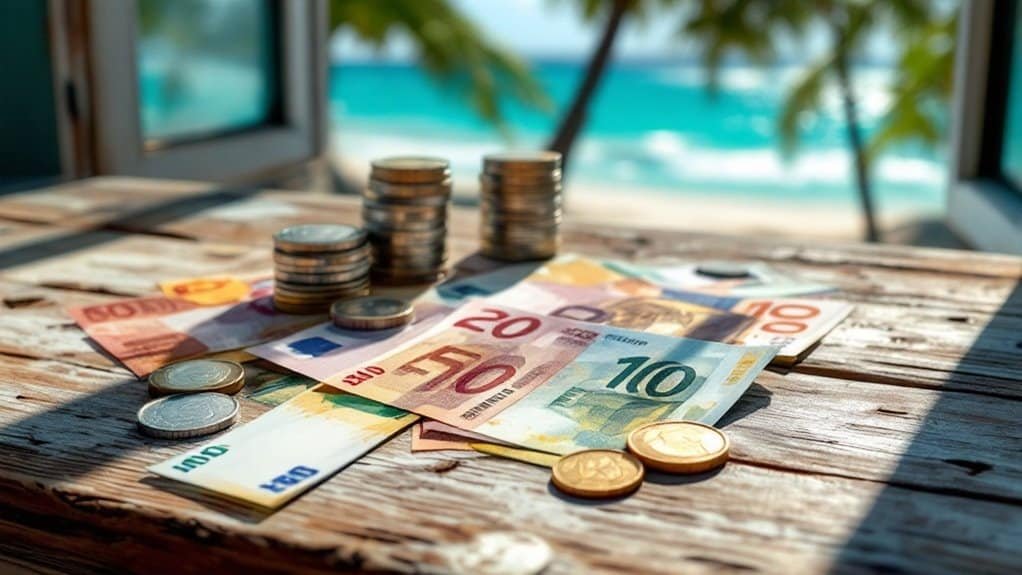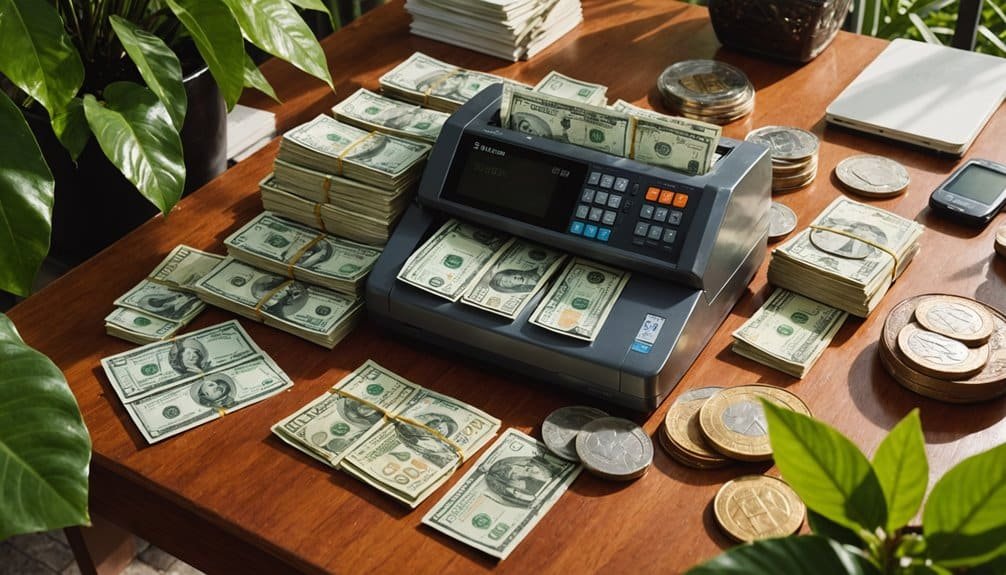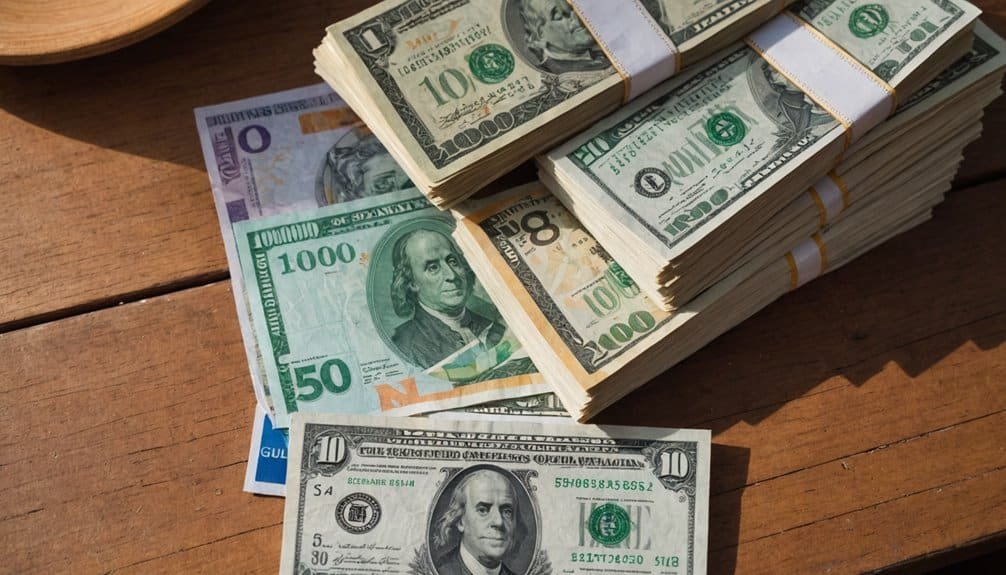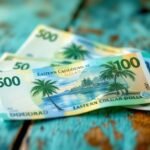
When visiting St. Maarten, you'll find a flexible currency environment where US dollars, euros, and Netherlands Antillean guilders are widely accepted. You can use major credit cards like Visa and MasterCard in most tourist areas, with ATMs dispensing multiple currencies. Bank exchanges offer the most competitive rates, so avoid hotel currency services. Remember to declare any cash over ANG 20,000 at airports and seaports. As the island shifts to the Caribbean guilder, maintaining a US dollar peg, understanding these financial nuances will help you navigate transactions smoothly. Stick around to uncover more strategic financial insights for your Caribbean adventure.
Key Takeaways
- Multiple currencies circulate on St. Maarten, including Netherlands Antillean guilder, US Dollar, and Euro, offering travelers flexible payment options.
- Always carry cash for small transactions, as digital payments are growing but not universally accepted across the island's Dutch and French sides.
- ATMs are widely available in Philipsburg and Marigot, dispensing US dollars and euros, providing convenient currency withdrawal for tourists and residents.
- Check currency declaration requirements: amounts over ANG 20,000 must be reported at airports and seaports to comply with local financial regulations.
- Exchange money at banks for the most competitive rates, avoiding hotel exchange services which typically offer less favorable currency conversion terms.
Currency Landscape of St. Maarten
Throughout the Caribbean, St. Maarten offers a unique currency landscape that reflects its complex colonial history. Local banking services play a crucial role in supporting this diverse monetary environment.
You'll find the Netherlands Antillean guilder (ANG) as the official currency on the Dutch side, with the Euro used in French St. Martin. The currency symbols tell a rich story: the guilder, also known as the florin, has roots dating back to the 18th century.
Its currency history reveals shifts from the reaal to the guilder, with specific banknotes and coins introduced in the late 19th century. While the Netherlands Antillean guilder remains official, the US Dollar is widely accepted, creating a flexible monetary environment.
Curiously, the guilder is now set to be replaced by the Caribbean guilder, maintaining its current US Dollar peg of 1.79, demonstrating the island's adaptive financial ecosystem.
Cash and Card Payment Options
After exploring St. Maarten's currency landscape, you'll find diverse payment options to suit your needs. Cash and card payments are both widely accepted, with US dollars, Euros, and Netherlands Antillean guilders in circulation.
When handling cash, prioritize security by using hotel safes and avoiding unattended items. Major credit cards like Visa and MasterCard are prevalent, though American Express sees limited use. ATMs are conveniently located throughout the island, offering withdrawals in multiple currencies. Bank exchange rates fluctuate daily, impacting travelers' financial planning.
Credit card security requires vigilance; stick to reputable establishments and monitor transactions closely. Debit cards remain popular, with 87% of respondents using them monthly.
While digital payments increasingly dominate, carrying some cash guarantees flexibility across different venues and small transactions.
Smart Currency Exchange Strategies

When planning your St. Maarten trip, you'll want to leverage bank exchange services and ATM cash access for ideal currency management.
Banks offer reliable and competitive exchange rates during limited operating hours, while ATMs provide convenient withdrawals in Euros or Netherlands Antillean guilders with generally favorable rates. For instance, understanding current currency exchange rates can help travelers optimize their financial strategies during their visit.
Bank Exchange Benefits
Wondering how to make the most of your currency exchange in St. Maarten? Banks offer unparalleled currency stability and exchange security.
They're considered the safest option, providing more stable rates and transparent transactions. You'll find branches throughout the island, ensuring convenient access.
When comparing exchange options, banks often present competitive rates, especially for larger transactions. They can help you manage currency risks by locking in rates and creating personalized strategies.
While operating hours might be limited, the benefits outweigh this minor inconvenience. Forward contracts with banks enable strategic financial planning by allowing customers to secure exchange rates for future payments up to two years in advance.
Banks excel at handling various currency needs, from small exchanges to complex international transactions. They provide a reliable, secure environment that minimizes fraud risks.
ATM Cash Access
Throughout your St. Maarten visit, managing ATM cash access requires strategic planning. You'll find numerous ATMs across the island, excluding Orient Bay, with most accepting major international cards. Island banking infrastructure supports convenient cash withdrawal options for tourists.
On the Dutch side, you can withdraw US Dollars, Euros, or Netherlands Antillean guilders, while the French side offers limited US Dollar dispensing.
Prioritize ATM security by selecting well-lit locations inside banks or shopping centers. Shield your PIN, stay vigilant, and choose ATMs affiliated with reputable banks to minimize fraud risks.
Consider withdrawing larger amounts to reduce transaction fees and leverage better exchange rates compared to currency exchange offices.
Before traveling, inform your bank about your trip, verify card compatibility, and carry a backup card for added financial flexibility.
Banking Services for Travelers
When traveling to St. Maarten, you'll find banking services readily accessible across the island, with numerous branches and ATMs strategically located in Philipsburg, Marigot, and key transportation hubs.
Most banks offer convenient hours, secure document storage, and currency exchange services that cater to international visitors.
You can expect to find reputable banks like Windward Island Bank, Scotiabank, and RBTT N.V. that provide reliable financial services and support for tourists.
ATM currency options Travelers can withdraw either U.S. dollars or euros from ATMs on the Dutch side of the island, with French side ATMs dispensing only euros.
Bank Hours and Access
Maneuvering banking services in St. Maarten requires understanding local banking schedules.
On the Dutch side, banks operate Monday to Friday from 8:30am to 3:30pm, with Saturday hours from 9am to noon. French side banks have slightly different hours, closing at 1:30pm on weekdays. Most banks remain closed on Sundays.
ATM access is widespread, with machines located at Princess Juliana International Airport, A.C. Wathey Cruise Facility, Philipsburg, and Simpson Bay.
You'll find ATMs from major banks like Windward Island Bank, Scotiabank, and FirstCaribbean Bank. Dutch side ATMs offer dollar and euro options, while French side machines dispense only euros.
Both sides' ATMs are compatible with Cirrus and PLUS networks, ensuring convenient cash access during your stay.
The local credit bureau plays a crucial role in managing financial information and ensuring responsible banking practices across the island.
Document Storage Options
After exploring St. Maarten's banking landscape, you'll quickly realize that secure document storage isn't a service provided by local banks. Travelers must take personal responsibility for their document security. Limited luggage storage at the Ferry Terminal in Marigot suggests the need for travelers to be self-sufficient in managing personal belongings.
| Storage Option | Availability | Security Level |
|---|---|---|
| Bank Services | Not Offered | N/A |
| Hotel Storage | Limited | Low |
| Personal Carry | Recommended | High |
| Digital Backup | Self-Managed | Medium |
| Third-Party | Not Available | N/A |
While banks excel at handling financial information, they don't offer travel document storage solutions. Your best approach is to maintain personal control of critical documents. Consider digital backups, secure physical copies, and always keep important papers with you. The Ferry Terminal in Marigot might provide short-term luggage storage, but this doesn't extend to secure document preservation. Prioritize your travel document security through proactive personal management.
Currency Exchange Services
Maneuvering currency exchange in St. Maarten requires strategic planning. You'll find multiple currency exchange methods across the island, with local banks and dedicated exchange offices offering the most competitive exchange rates. Online platforms can provide additional options for comparing rates before your trip.
Banks operate Monday through Friday from 8:30 am to 3:30 pm, covering both Dutch and French sides. ATMs, known as DABs on the French side, provide convenient withdrawal options in Euros or Netherlands Antillean guilders.
When selecting an exchange location, prioritize reputable offices with transparent fees. Avoid hotel exchange services, as they typically offer less favorable rates.
Research beforehand, checking current rates and potential withdrawal fees. Currency exchange offices in tourist areas like Marigot and Philipsburg provide secure transactions, ensuring you maximize your financial resources during your island visit.
Currency Regulations and Declarations

When traveling to St. Maarten, you'll need to understand critical currency declaration requirements. The island mandates that any amount over ANG 20,000 must be formally declared at entry or exit points. Caribbean financial authorities strictly enforce these monetary reporting protocols to maintain transparent financial transactions.
Currency declaration importance can't be overstated, as compliance consequences can be severe, potentially resulting in substantial fines or legal action.
At airports and seaports, you'll find declaration forms readily available. Fill these out accurately and completely, providing all required documentation about your cash amounts.
Exchange facilities are widespread, with banks and reputable exchange offices offering competitive rates. Always carry supporting financial documentation and remain transparent about your monetary holdings.
Failure to comply with local regulations isn't an option. Ignorance won't protect you from potential penalties, so stay informed and diligent about St. Maarten's currency rules.
Future Currency Transformations
Beyond the current currency regulations, St. Maarten is preparing for a significant currency overhaul.
The upcoming introduction of the Caribbean Guilder represents a critical shift in the region's monetary landscape, reflecting emerging currency evolution trends. Regional constitutional reforms have been a driving force behind this transformative monetary strategy.
Key considerations for this change include:
- 💱 Embrace the seamless 30-year exchange window
- 🏦 Prepare for thorough financial system updates
- 💻 Anticipate potential digital currency impact
- 🌍 Recognize the strategic economic repositioning
You'll need to stay informed about the new currency's implementation.
The Central Bank of Curacao and St. Maarten will manage this change, ensuring a smooth integration of the Caribbean Guilder.
Businesses, financial institutions, and residents must adapt to these changes, understanding that this overhaul aims to stabilize and modernize the economic environment.
Conclusion
When traveling to St. Maarten, you'll need to navigate its unique currency landscape strategically. Don't put all your eggs in one basket—carry both cash and cards, understand exchange rates, and be aware of banking services. Stay informed about local currency regulations to avoid financial surprises. By planning ahead and remaining adaptable, you'll guarantee a smooth monetary experience in this Caribbean destination.







Interesting read! However, wouldnt it be more beneficial for tourists if St. Maarten adopted a widely accepted international currency to reduce exchange hassles? Just food for thought!
Interesting read. Anyone else think that crypto could modernize St. Maartens currency landscape? Seems like a potential game-changer.
Interesting read, but do the locals prefer cash or card? And would it be more beneficial to exchange currency before arrival or locally? Just curious about the practical side of things.
Interesting piece! But can someone clarify how ATMs work in St. Maarten with foreign cards? Are there additional fees?